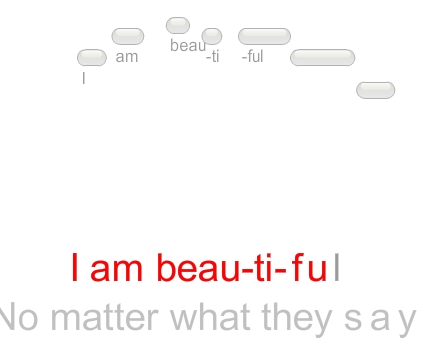Esto es la carta que escribió una señora al programa de Luis del Olmo para que la leyeran en directo:
Desde que las insignias se llaman pins, los maricones gays, las comidas frías lunchs, y los repartos de cine castings, este país no es el mismo: ahora es mucho, muchísimo más moderno.
Antaño los niños leían tebeos en vez de comics, los estudiantes pegaban posters creyendo que eran carteles, los empresarios hacían negocios en vez de business, y los obreros, tan ordinarios ellos, sacaban la fiambrera al mediodía en vez del tupper-ware. 
Yo, en el colegio, hice aeróbic muchas veces, pero, tonta de mi, creía que hacía gimnasia. Nadie es realmente moderno si no dice cada día cien palabras en inglés. Las cosas, en otro idioma, nos suenan mucho mejor.
Evidentemente, no es lo mismo decir bacon que panceta, aunque tengan la misma grasa, ni vestíbulo que hall, ni inconveniente que handicap… Desde ese punto de vista, los españoles somos modernísimos.
Ya no decimos bizcocho, sino plum-cake, ni tenemos sentimientos, sino feelings. Sacamos tickets, compramos compacts, comemos sandwiches, vamos al pub, practicamos el rappel y el raffting; en lugar de acampar, hacemos camping y, cuando vienen los fríos, nos limpiamos los mocos con kleenex.
Esos cambios de lenguaje han influido en nuestras costumbres y han mejorado mucho nuestro aspecto. Las mujeres no usan medias, sino pantys y los hombres no utilizan calzoncillos, sino slips, y después de afeitarse se echan after shave, que deja la cara mucho más fresca que el masaje.
El español moderno ya no corre, porque correr es de cobardes, pero hace footing; no estudia, pero hace masters y nunca consigue aparcar pero siempre encuentra un parking. El mercado ahora es el marketing; el autoservicio, el self-service; el escalafón, el ranking y el representante, el manager.
Los importantes son vips, los auriculares walkman, los puestos de venta stands, los ejecutivos yuppies; las niñeras baby-sitters, y hasta nannies, cuando el hablante moderno es, además, un pijo irredento.
En la oficina, el jefe está siempre en meetings o brain storms ¡casi siempre con la public-relations!, mientras la assistant envía mailings y organiza trainings; luego se irá al gimnasio a hacer gim-jazz, y se encontrará con todas las de la jet, que vienen de hacerse liftings, y con alguna top-model amante del yogurt light y el body-fitness.
El arcaico aperitivo ha dado paso a los cocktails, donde se jartan a bitter y a roast-beef que, aunque parezca lo mismo, engorda mucho menos que la carne.Ustedes, sin ir más lejos trabajan en un magazine, no en un programa. En la tele, cuando el presentador dice varias veces la palabra O.K. y baila como un trompo por el escenario la cosa se llama show, bien distinto,como saben ustedes, del anticuado espectáculo; si el show es heavy es que contiene carnaza y si es reality parece el difunto diario “El Caso”, pero en moderno. Entre medias, por supuesto, ya no ponen anuncios, sino spots que, aparte de ser mejores, te permiten hacer zapping.

Estas cosas enriquecen mucho. Para ser ricos del todo, y quitarnos el complejo tercermundista que tuvimos en otros tiempos, sólo nos queda decir con acento americano la única palabra que el español ha exportado al mundo: la palabra “SIESTA.”
Espero que os haya gustado… yo antes de leerlo no sabía si tenía stress o es que estaba hasta los cojones”.
Comment:In English you never go footing or puenting , you go jogging or bungee jumping
 Are you learning Old-Fashioned English?
Are you learning Old-Fashioned English? 


 “
“